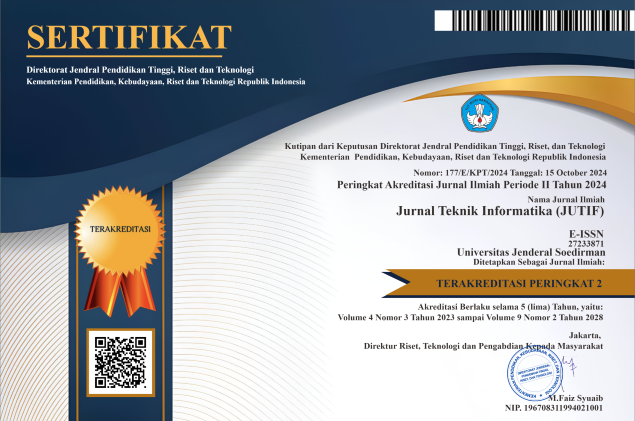USER EXPERIENCE IN METAVERSE BUILDING TRAINING USING PHOENIX-FIRESTORM SOFTWARE
DOI:
https://doi.org/10.52436/1.jutif.2025.6.1.3447Keywords:
3D virtual worlds, Phoenix-Firestorm, metaverse training, virtual learning, user experience, education technologyAbstract
This study aims to evaluate the effectiveness of training using Phoenix-Firestorm software in a 3D virtual environment (metaverse) for teachers, lecturers, and students. A total of 49 participants were involved in the online training consisting of seven sessions, facilitated through the Discord platform for voice communication. Each participant was given a virtual area of 35x35 meters for practice, with daily guidance via Discord chat. The training was designed to equip participants with basic skills in building 3D objects, including an understanding of the software and building techniques. After the training, a survey was conducted using a Likert scale of 1-9 to assess participants' understanding of navigation, software customization, virtual communication, and problem-solving. The survey results showed that the majority of participants found Phoenix-Firestorm relatively easy to use, although some challenges were reported regarding the complexity of the interface. These findings will be used as a basis for developing more effective and user-friendly training guidelines in the future, with a focus on improving accessibility and user experience in the context of technology-based learning. This study is in line with previous studies that show the potential of virtual worlds in education, as discussed by Jusuf (2023). Additionally, the use of virtual technology in education is also supported by research on the effectiveness of virtual learning environments, as explained by Wang et al (2022), that digital games contributed to a moderate overall effect size when compared with other instructional methods. These findings are expected to make a significant contribution to the development of innovative training methods in education in the digital era.
Downloads
References
J. D. N. Dionisio, W.G. Burns III, R. Gilbert, “3D Virtual Worlds and The Metaverse: Current Status and Future Possibilities” ACM Computing Surveys, vol. 45, no. 3, article 34, pp. 1-38, 2013. [Online] Available: http://dx.doi.org/10.1145/2480741.2480751
M. Kebritchi, A. Hirumi, and H. Bai, "The Effects of Modern Mathematics Computer Games on Mathematics Achievement and Class Motivation," Computers & Education, vol. 55, no. 2, pp. 427-443, 2010. [Online]. Available: https://doi.org/10.1016/j.compedu.2010.02.007
T. de Jong and W. R. van Joolingen, "Scientific Discovery Learning With Computer Simulations of Conceptual Domains," Review of Educational Research, vol. 68, no. 2, pp. 179-201, 1998. [Online]. Available: https://doi.org/10.3102/00346543068002179
Kementerian Pendidikan dan Kebudayaan, “Panduan Teknologi Pendidikan Dalam Kurikulum Merdeka Belajar,” Jakarta, Indonesia: Kemdikbud, 2020.
R. C. Anderson and L. Simons, "Motivation to Learn in A Simulated Classroom Environment: The Role of Technology and Simulation," Journal of Educational Psychology, vol. 102, no. 4, pp. 896-909, 2010. [Online]. Available: https://doi.org/10.1037/a0019215
M. Moscato and S. Altschuller, "Learning Styles in Educational Technology: Adaptive Simulations and Personalized Learning," Journal of Educational Technology Systems, vol. 47, no. 1, pp. 23-39, 2019. [Online]. Available: https://doi.org/10.1177/0047239519863132
S. Sarabdeen, "Learning Styles and e-Learning Face-To-Face to The Implementation of Simulations in Learning," Journal of Educational Technology Development and Exchange, vol. 6, no. 2, pp. 45-56, 2013. [Online]. Available: https://doi.org/10.18785/jetde.0602.03
D. Vlachopoulos and A. Makri, "The Effect of Games and Simulations on Higher Education: A Systematic Literature Review," International Journal of Educational Technology in Higher Education, vol. 14, no. 1, 2017. [Online]. Available: https://doi.org/10.1186/s41239-017-0062-1
J. R. Domingo and E. G. Bradley, "Education Student Perceptions of Virtual Reality as A Learning Tool," Journal of Educational Technology Systems, vol. 46, no. 3, pp. 329-342, 2018. [Online]. Available: https://doi.org/10.1177/0047239517736873
F. Bellotti, B. Kapralos, K. Lee, P. Moreno-Ger, and R. Berta, "Assessment In And of Serious Games: An Overview," Advances in Human-Computer Interaction, 2013. [Online]. Available: https://doi.org/10.1155/2013/136864
M. Riopel, L. Nenciovici, P. Potvin, P. Chastenay, P. Charland, J. B. Sarrasin, and S. Masson, "Impact of Serious Games on Science Learning Achievement Compared with More Conventional Instruction: An Overview and A Meta-Analysis," Studies in Science Education, 2019. [Online]. Available: https://doi.org/10.1080/03057267.2019.1722420
S. de Smale, T. Overmans, J. Jeuring, and L. van de Grint, "The Effect of Simulations and Games on Learning Objectives in Tertiary Education: A Systematic Review," Lecture Notes in Computer Science, vol. 9783, pp. 506–515, 2016. [Online]. Available: https://doi.org/10.1007/978-3-319-40216-1_55
L. K. Smetana and R. L. Bell, "Using Computer Simulations to Enhance Science Teaching and Learning," Technology in the Secondary Science Classroom, 2015.
L. H. Wang, B. Chen, G. J. Hwang, J. Q. Guan, and Y. Q. Wang, "Effects of Digital Game-Based STEM Education on Students’ Learning Achievement: A Meta-Analysis," International Journal of STEM Education, vol. 9, no. 22, 2022. [Online]. Available: https://doi.org/10.1186/s40594-022-00344-0
T. Anastasiadis, G. Lampropoulos, and K. Siakas, "Digital Game-Based Learning and Serious Games in Education," International Journal of Advances in Scientific Research and Engineering, 2018. [Online]. Available: https://doi.org/10.31695/ijasre.2018.33016
J. Shen and L. B. Eder, "Intentions to Use Virtual Worlds for Education," Journal of Information Systems Education, 2009.
R. Bartle, “Designing Virtual Worlds,” New Riders, 2003.
J. D. N. Dionisio, W. G. Burns, and R. Gilbert, "3D Virtual Worlds and The Metaverse: Current Status and Future Possibilities," ACM Computing Surveys, vol. 45, no. 3, 2013. [Online]. Available: https://doi.org/10.1145/2480741.2480751
V. Sotikare, "UI/UX in Gaming: Role of Gestalt psychology in Designing Better Interfaces," Journal of Game Design, vol. 11, no. 1, pp. 32-45, 2023.
Z. Dai, ”Role-Play in Virtual Reality,” Designing, Deploying, and Evaluating Virtual and Augmented Reality in Education Advances in Educational Technologies and Instructional Design, ISSN: 2326-8905, pp. 143-163, 2021. [Online]. Available: https://doi.org/10.4018/978-1-7998-5043-4.ch007
H. Jusuf, L. S. Istiyowati, M. Fauzi, M. Magdalena, R. E. Indrajit, “Metaverse-Based Learning in The Digital Era”, Jurnal Teknologi Pendidikan, vol. 25, no. 3, pp. 334-346, 2023. [Online]. Available: https://doi.org/10.21009/jtp.v25i3.35071
M. C. Atak, E. E. Özkoç, “The Impact of Metaverse in Work Life: A Delphi Study,” Journal of Metaverse, vol. 3, issue 2, pp. 144-151, 2023. [Online]. Available: https://doi.org/10.57019/jmv.1297129
A. Yasuda, “A Metaverse Ethics: Exploring The Social Implications of The Metaverse,” AI Ethics, 2024. [Online]. Available: https://doi.org/10.1007/s43681-024-00507-5


























